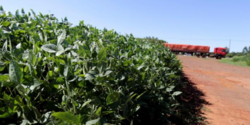Financial Express | 28 August 2023
Cultivating change: India’s exploration of contract farming in Latin America for enhanced food security
A delegation of agriculture and MSMEs agriculturists is set to travel to Paraguay, driven by the prospect of procuring land and initiating farming ventures.
by Huma Siddiqui
A delegation of agriculture and MSMEs agriculturists is set to travel to Paraguay, driven by the prospect of procuring land and initiating farming ventures. This burgeoning interest was spurred by a recent webinar jointly organized by the Indian Mission in Paraguay and industry body FICCI.
According to India’s Ambassador Yogeshwar Sangwan, Paraguay told Financial Express Online that Pavan Chaudhary from the Office of the Chief Minister Haryana during the webinar revealed plans for an imminent delegation visit, highlighting Paraguay’s abundant potential in farming.
The backdrop against which such endeavors are unfolding is marked by declining water tables and erratic monsoons in North India, the very heart of the nation’s agricultural production. These climatic shifts have led to a recurrent shortfall in domestic food output, casting a shadow on the nation’s food security. In response, agricultural associations are turning their gaze towards Latin America (LatAm), where agriculture holds significance akin to that of India’s IT industry. This burgeoning interest is not limited to farming alone; numerous companies are eyeing investments across various aspects of the agricultural value chain, from agro-inputs to food processing and logistics.
What’s prompting this growing interest in Latin America?
A crucial factor is the existing price arbitrage in the region’s high-quality farmland. The cost of ready-to-farm properties ranges from more than US$2000 to US$3000 per acre in countries like Paraguay and Uruguay, presenting an attractive opportunity for investment.
The intersection of food security and contract farming is at the core of this endeavor. Over the past decade and a half, more than 20 million hectares of agricultural land—equivalent to the entire agricultural expanse of France or one-fifth of the European Union’s total land area—have been leased by numerous nations. This trend is most prominent in African, Latin American, and East Asian countries. These land acquisitions have largely been motivated by the global squeeze on food markets and the urgency to ensure a stable food supply.
The question arises: can this model be feasibly implemented in India?
Evidently, this model holds significant promise within the Indian context. It could usher in a win-win scenario for both India and the host nations, particularly those in Africa and Latin America. The potential for expanding acreage and enhancing crop productivity is immense in these regions, making them attractive partners for such ventures.
A former senior diplomat opined that considerable room exists for collaboration between Indian businesses and the Latin American and Caribbean (LAC) region. Such collaboration could play a pivotal role in bolstering India’s food security and fostering advancements in agriculture and agricultural processing. With the potential to contribute to development on multiple fronts, this collaboration could hold the key to ensuring a more secure and sustainable future for India’s food production and supply.
In conclusion, the nexus between food security and contract farming is gaining prominence in Latin America, with Indian agricultural and MSMEs professionals exploring opportunities in Paraguay. As India seeks to address the challenges posed by climatic shifts and fluctuating food markets, the LatAm region presents an alluring prospect. By tapping into the high-quality farmland and collaborative potential of the region, India could pave the way for a mutually beneficial partnership that enhances food security, agricultural productivity, and economic development.













